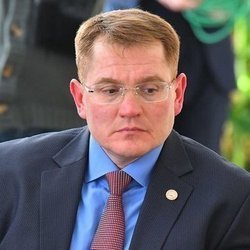Rustam Minnikhanov: 'When forming a family, it is necessary to give a person the opportunity to have a place of their own'
The president of Tatarstan and Russia's deputy prime minister proposed to expand the list of categories of recipients of preferential mortgages
The cost per square metre of housing in Kazan new buildings has grown to cosmic heights — 150-200 thousand rubles. Developers are not ready to “drop” the prices, buyers cannot afford such housing, as a result, both the construction complex and the social network are stalling. The president of Tatarstan, chairperson of the Commission of the State Council of the Russian Federation on Construction, Housing and Communal Services and Urban Environment, Rustam Minnikhanov, answering the questions of Realnoe Vremya, suggested a way out of the impasse — to expand the list of categories of recipients of preferential mortgages. Deputy Prime Minister of Russia Marat Khusnullin also gave the same recipe for stimulating the development of the construction industry at the Gaidar Forum: “Maybe we should expand preferential categories of citizens.” Read the details about the prospects in our material.
“It should have been bought yesterday”
“It should have been bought yesterday, and today it is also necessary to buy," Rustam Minnikhanov answered the question of the editor-in-chief of Realnoe Vremya whether it is worth buying housing now for those who need it or it makes sense to wait for prices to decrease. “Yes, prices have increased, but first of all, it has affected Kazan. In our other settlements, the situation is much more stable. There are several reasons. Kazan is very attractive, everything is usually bought up. We have a social mortgage programme — there, in my opinion, if I'm not mistaken, it is 55 or 53 thousand rubles per square metre. This programme does work. It is advisable to buy housing — it will not get cheaper. Moreover, the preferential rate now remains only for those categories that have already been determined.”
The president of Tatarstan stressed that pricing in this area has seriously been affected by several factors — the pandemic, due to which migrants left construction sites, and local workers had to pay more, the good work of the tax inspectorate to identify gray schemes and as a result — the growth of tax deductions, which is embedded in the price, as well as the out-of-control increase in prices for building materials.
Rustam Minnikhanov shared a “recipe” that, as he believes, will help to find a way out of today's impasse — not only to preserve, but also to expand the list of categories of recipients of state support when buying housing, in particular at the expense of young families, young scientists, to revise support measures for them. He proposed to introduce preferential mortgages in the secondary housing market, as well as to create service housing, build small-family homes for those who are just starting their way of life, since it is impossible to solve the problem of accessibility with one social mortgage programme — it removes many issues, but not all:
“The most important thing is that at the beginning of life, when forming a family, it is necessary to give a person the opportunity to get a place of their own somehow. And if they have nothing, then there is no chance. We will work to raise affordability. Preferential mortgage on the secondary market.. We need to understand whom we are giving this preferential mortgage to. Not to everyone, but what category and in what volumes. I think that this will not make the state poorer, it will be more stable and richer in the future.”
All this needs to be seriously worked out, the president stressed.
“The situation is complicated, but we have to look for mechanisms”
As Realnoe Vremya found out, neither the State Housing Fund under the President of the Republic of Tatarstan nor the Ministry of Construction of the Republic of Tatarstan have yet worked out proposals to expand the list of recipients of mortgage benefits, and according to Realnoe Vremya's own source, these departments have not even received a corresponding order from the president.
However, judging by what Russian Deputy Prime Minister Marat Khusnullin said at the Gaidar Forum, the issue of expanding the number of categories of recipients of state support for the purchase of housing should be decided at the level of the Russian Federation, not the regions. Difficulties for the development of the construction industry are created by the growth of mortgage rates. When the Central Bank's key rate was lower and the previous conditions of preferential mortgages were in effect, the market was actively growing, he noted:
“Now the situation is more complicated, but we have to look for mechanisms for how we will get out of this. Maybe to expand preferential categories of citizens," Khusnullin reasoned.
Realnoe Vremya has sent a request for work in this direction to the Russian Ministry of Construction, the department's response will be published upon receipt.
Criterion should be a shortage of personnel

However , the State Duma deputy also outlined the flip side of the coin:
“Experience has shown that the more we subsidise housing, the faster its cost increases, and as a result, it is very important to ensure the affordability of square metres!”
Those who need support, Farrakhov added, should include both disabled and elderly specialists, but the solution to their housing problems, as he believes, can be solved through another form of support — affordable social rental housing, which is now practically non-existent: “There are not even public rental housing left.”
“There is also the so-called unfunded mandate, which was transferred from the federal centre to the Russian regions — to provide free housing for orphans. I receive a lot of appeals about this. This issue is financially costly, today in Russia about 800 billion rubles are needed for these purposes, and there are a significant number of court decisions in favour of orphans. People have the right, but for the subjects, it is an unaffordable task, and the law is not being implemented. The issue of support for this category also needs to be resolved.”
“The list of beneficiaries should be mobile”

The task of the state, says Tygin, is to support areas that are important for the state: to provide housing for rural doctors, for example, or employees of large city-forming and important enterprises for the country's economy (not necessarily state-owned). Since the needs change, the list of beneficiaries should also change.:
“It should be very relevant and very mobile. The state should clearly respond based on strategic priorities, for example, for the next 30 years for healthcare, and from 'short' ones aimed at supporting specific local projects, for example, for Naberezhnye Chelny, today it is important to attract the Chinese — it is necessary to build a house for them.”
At the same time, the stimulating mechanisms of state participation in the commercial housing market themselves should be addressed not to builders, Tygin stressed, but exclusively to consumers, since assistance to the developer will inevitably result in “a rise in price and murky incomprehensible schemes”. And these mechanisms should involve the secondary housing in the market:
“The institution of the secondary market is not formulated at all and is outside the field of state interests. For me, it seems absolutely right to launch a step-by-step investment mechanism, when buyers move into new, possibly expensive houses, and their old apartments do not stay with them but are bought out by those who are motivated to purchase them. Today, this housing is a very difficult asset to sell. But everything will change if we expand the secondary housing market in every possible way, include it in all the benefits tools and create chains of “one-room” — “two-room” — “three-room” by launching local secondary housing markets tied to specific areas of the city. Otherwise, we run the risk of renting housing in much larger volumes than in the Soviet Union, and after 10 years we will hear that people are not satisfied with the housing situation. And we are pursuing on a national scale the goal not to build housing, but to satisfy the demand of the population for it!”
Will we support the private housing construction — will we form more responsible citizens?
From the issue of expanding the categories of recipients of state support, Alexander Tygin moved on to the question of which housing purchase urgently needs state “sponsorship”:
“Today, the state is completely indifferent to individual housing, although we now have 55-60 percent of the construction of private housing! There is a chaotic, in fact, building, where then there are no schools, no kindergartens, no roads, well, at least the state now provides gas. But many people want to live on the land, have a vegetable garden, banya. Why don't we build townhouses around Kazan, where possible? To build blocks, with roads, infrastructure — this is what the population needs, and not what the state or businesses offer. And it is possible to subsidise the private housing construction, the demand for which the population is now dominant. Building a house using modern technologies will cost much cheaper than buying an apartment in a residential complex, it is beneficial to the tenant. However, subsidising private housing construction will cost the state many times more. Investing a million rubles in an apartment building in the form of assistance, we will get 20 thousand square metres, investing the same amount in residential housing, we will get two thousand. So the position of the authorities is economically conditioned, there are no such resources yet. But if there is a different federal position, we will get other, in fact, citizens from families living on the ground, in their homes. They will have a completely different self-consciousness than the owners of just wallpaper and furniture living in the apartment — a completely different sense of responsibility is formed under their roof.”
Besides, Alexander Tygin reminded that for certain categories of the population it is necessary to build housing for social use, which will never become property and is given only for life. Those who have the right to receive such housing do not have the opportunity to collect even the minimum initial instalment, they have been in the waiting list since the 1980s, there are tens of thousands of them in municipalities, and they receive housing only in case of the death of a resident of a municipal apartment, of which there are very few left.
“These programmes will lead to an increase in the cost of housing”
However, the expert of Realnoe Vremya pointed out a serious problem — the more state support citizens who need to buy a housing receive, the more the price flywheel spins:
“A programme for families with children and a programme for young scientists will be in demand. But these programmes will definitely lead to an increase in the cost of housing if there is no strict selection, if everyone is included in them and if these programmes apply to all types of housing. The cost will increase as demand increases.”
The rise in prices per square metre contributes to the “monopolisation” of the housing market, which is provided to preferential categories of buyers. Gizatova illustrated her point — she cited as an example the federal programme “Family Mortgage”, related exclusively to new buildings. The condition for subsidising the rate is the purchase of apartments from a developer, who, as a rule, has overpriced prices, she says.
“The good idea with a preferential mortgage, aimed at supporting developers in the conditions of the coronavirus pandemic, made housing unaffordable," the expert concludes. “Those are lucky who managed to enter the programme at the start, but then payment increased dramatically. The interest rate decreased, but the cost per square meter rose so much that it would be more profitable for people to buy an apartment at a higher rate, but at the old cost of housing, as long as it remained within reasonable limits. But it turned out that the preferential mortgage did not correct the situation.”
“We need subsidies that will provide a real opportunity to get housing”

According to Khuzina, the idea of Rustam Minnikhanov to expand the list of categories of recipients of state support is very good and timely, but it is also necessary to take into account the problems with solvency that many people have today — for example, it has become more difficult to save up for an initial payment:
“There should be subsidies that will provide a real opportunity to get housing for those in need. But service housing should be given only to those specialists who are not enough, who need to be kept in the workplace. But they should live in it only while they are working — and this will just give them the opportunity to save up for their own housing.”
Daria Khuzina also believes that state support is also needed for enterprises that make contributions to the housing fund in order to provide their employees with the opportunity to purchase apartments on preferential terms.